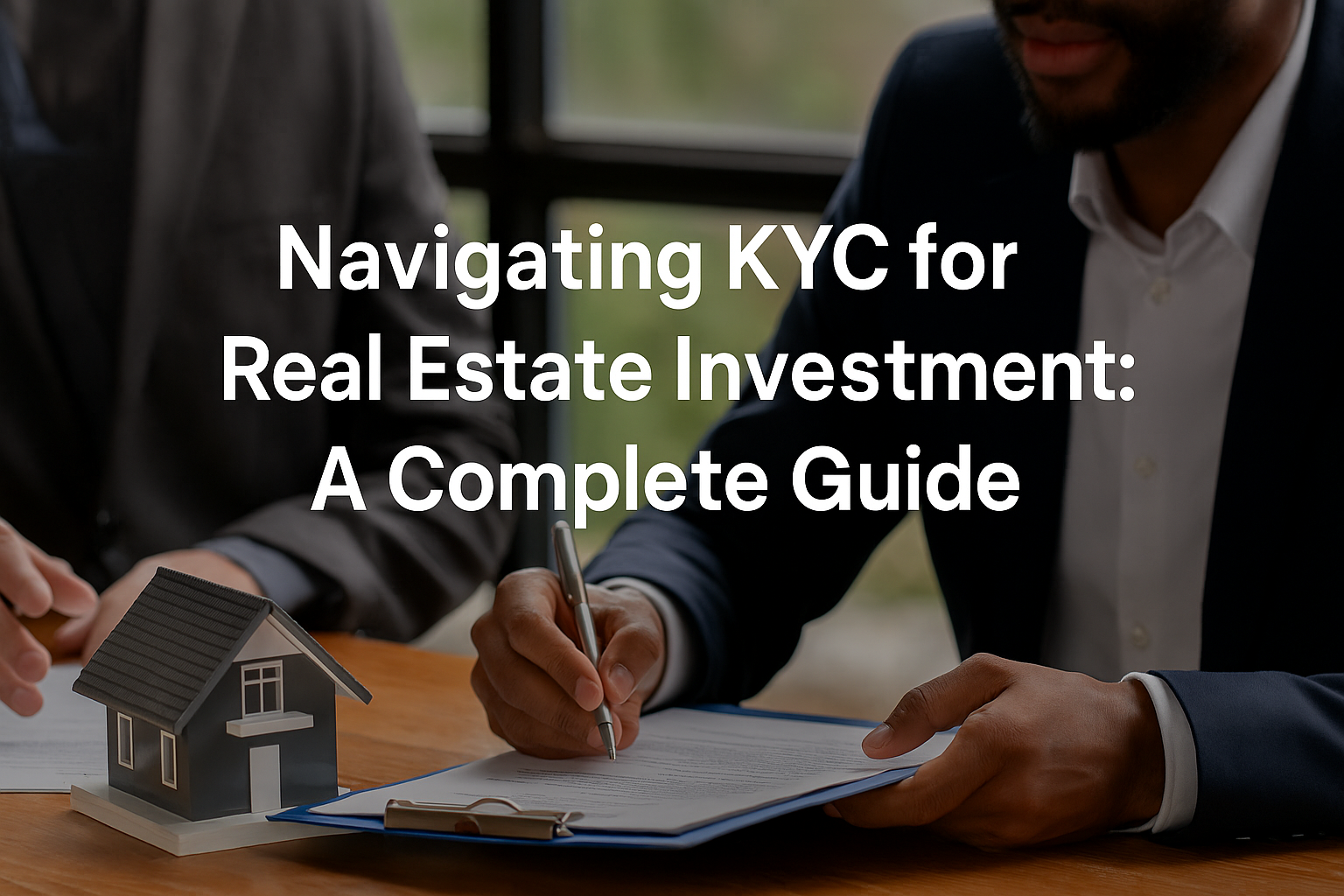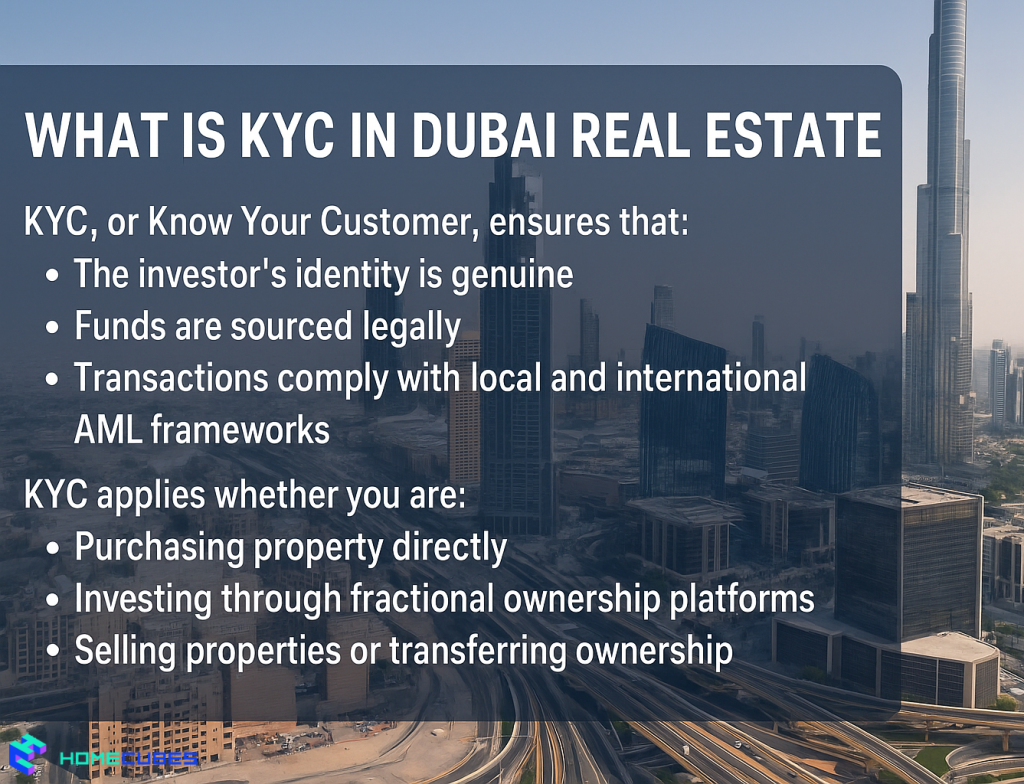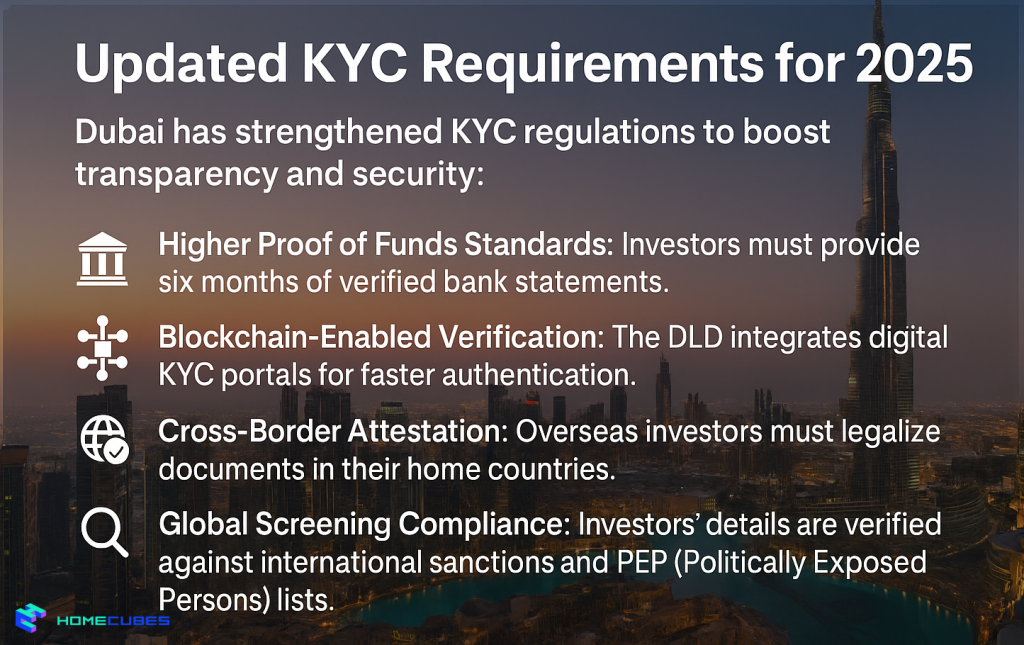

Table of Contents
- Introduction
- What is KYC in Dubai Real Estate
- Why KYC Compliance Matters for Investors
- Updated KYC Requirements for 2025
- Step-by-Step KYC Process for Real Estate Investments
- Key Documents Required for KYC Approval
- Common Challenges in KYC and How to Overcome Them
- Case Study: Successful KYC Approval for an Overseas Investor
- Mistakes to Avoid During KYC Submission
- Fees and Processing Timelines for KYC
- Tips to Streamline Your KYC Process
- FAQs
- Conclusion
- Homecubes Guidance
Introduction
Dubai’s property market continues to attract investors worldwide thanks to advantages associated with early investment in Dubai property market such as lucrative returns, innovative developments, and investor-friendly policies. But before you can buy, sell, or participate in property investment schemes, you must complete the Know Your Customer (KYC) process.
The KYC process for real estate investors in Dubai is a legal requirement designed to verify your identity, assess your source of funds, and ensure full compliance with UAE anti-money laundering (AML) regulations. With 2025 updates tightening compliance, understanding and preparing for KYC is now essential for seamless property transactions.
What is KYC in Dubai Real Estate
Know Your Customer (KYC) isn’t just compliance—it’s the backbone of secure trade finance. Strong KYC ensures transparency, reduces fraud, and builds trust in global LCs, SBLCs, and guarantees.#TradeFinance #KYC #Compliance #GlobalTrade #LettersOfCredit #RiskManagement pic.twitter.com/fUZkKvDHn4
— Sanjay Thakrar (@SanjayThakrar12) September 3, 2025
KYC, or Know Your Customer, is a mandatory verification process introduced by the Dubai Land Department (DLD) and overseen by the Real Estate Regulatory Agency (RERA). It is an essential step for people who want to thrive as Dubai investors in 2025. It ensures that:

- The investor’s identity is genuine
- Funds are sourced legally
- Transactions comply with local and international AML frameworks
KYC applies whether you are:
- Purchasing property directly
- Investing through fractional ownership platforms
- Using real estate tokenization platforms
- Selling properties or transferring ownership
For official information, visit AMLUAE.
Why KYC Compliance Matters for Investors
Completing KYC is more than just a formality—it’s an essential step in ensuring:
- Transaction Security: Protects buyers and sellers from fraud
- Legal Compliance: Aligns with UAE AML and CFT laws
- Faster Approvals: Avoids delays in property registration and mortgage applications
- Access to Digital Investments: Essential for participating in blockchain-powered property tokenization
Updated KYC Requirements for 2025
Dubai has strengthened KYC regulations to boost transparency and security:

- Higher Proof of Funds Standards: Investors must provide six months of verified bank statements.
- Blockchain-Enabled Verification: The DLD integrates digital KYC portals for faster authentication.
- Cross-Border Attestation: Overseas investors must legalize documents in their home countries.
- Global Screening Compliance: Investors’ details are verified against international sanctions and PEP (Politically Exposed Persons) lists.
Step-by-Step KYC Process for Real Estate Investments
Create an Investor Profile
Register on the DLD REST app or apply through a DLD-approved trustee.
Submit Required Documents
Upload identity, residency, and financial documents (details below).
Identity Verification
Complete biometric or video verification when applying digitally.
AML & Compliance Screening
Authorities conduct real-time checks on funds and investor eligibility.
Final KYC Approval
Once approved, you’ll receive a clearance certificate allowing you to proceed with property transactions.
Key Documents Required for KYC Approval
For individual investors:
- Valid passport (6+ months)
- UAE residence visa (if applicable)
- Emirates ID (for residents)
- Proof of funds (bank statements or income certificates)
- Source of funds declaration
- Proof of address (recent utility bill)
For corporate investors:
- Trade license copy
- Memorandum of Association (MOA)
- List of authorized signatories
- Company bank statements
- Shareholder ID documents
Tip: Always confirm the latest KYC document requirements via the Dubai Land Department portal or consult a DLD-approved trustee for personalized guidance.
Common Challenges in KYC and How to Overcome Them
- Cross-Border Attestation Delays: Overseas applicants should start early to avoid rejections.
- Incomplete Documentation: Ensure all required documents are notarized and up to date.
- Name Screening Issues: If your name matches flagged databases, prepare extra identity proof.
- Proof of Funds Confusion: Use transparent banking channels to avoid compliance delays.
Case Study: Successful KYC Approval for an Overseas Investor
Investor: Priya Menon, Indian expat based in Singapore
Investment Goal: Participate in fractional ownership for an off-plan Dubai property
Challenges Faced:
- Delays in notarizing cross-border documents
- Clarifying source of funds for investment eligibility
Solution:
By preparing verified six-month bank statements and engaging a DLD-approved trustee, Priya completed her KYC in 12 business days, enabling her to finalize her Dubai investment without delays.
Mistakes to Avoid During KYC Submission
- Submitting expired documents
- Omitting legalized cross-border certificates
- Using unaccredited translation services
- Failing to declare source of funds accurately
- Waiting until the purchase deadline to start KYC
Fees and Processing Timelines for KYC
| KYC Service | Cost (AED) | Processing Time |
| Standard KYC Verification | 200 – 500 | 3 – 5 business days |
| Enhanced Due Diligence | 500 – 1,200 | 5 – 10 business days |
| Overseas Document Attestation | 300 – 1,000 | 7 – 15 business days |
Tips to Streamline Your KYC Process
- Start document collection early.
- Work with DLD-approved trustees for smoother submissions.
- Keep your bank statements and proof of funds clear and traceable.
- For investments in tokenized real estate, prepare for additional blockchain KYC checks.
FAQs
Is KYC mandatory for all Dubai property buyers?
Yes, for both residents and overseas investors.
Can I complete KYC remotely?
Yes, via the DLD REST app, but overseas applicants need notarized documents.
How long does KYC approval last?
Typically 12 months before re-verification is required.
Do fractional ownership investors also need KYC?
Absolutely. Platforms offering tokenized properties require full KYC compliance.
Conclusion
The KYC process for real estate in Dubai is no longer just a regulatory formality—it’s a gateway to seamless investments in one of the world’s most dynamic property markets. With the 2025 updates, investors must now meet stricter documentation and compliance standards, but the process has also become faster and more secure thanks to digital KYC platforms and blockchain-enabled verification.
By preparing your documents early, understanding Dubai’s AML-driven requirements, and leveraging trusted trustees, you can avoid delays and ensure a smooth property registration experience. Whether you’re purchasing property outright, investing via fractional ownership, or exploring real estate tokenization, KYC approval is the first step toward unlocking these opportunities.
Homecubes Guidance
At Homecubes, we understand that navigating the KYC process for real estate in Dubai can feel overwhelming—especially for overseas investors. That’s why we’re preparing streamlined solutions to make compliance simpler and more efficient.
Our upcoming blockchain-powered platform will integrate KYC checks with fractional ownership models and property tokenization, enabling investors to manage identity verification and investment access in one secure interface.
While our VARA license is still pending, we’re staying ahead of every regulatory update to ensure that when we launch, our investors enjoy compliance-ready access to Dubai’s most exciting real estate opportunities.
Contact Homecubes today to learn how we’re helping investors prepare for the future of property investment in Dubai—secure, transparent, and fully compliant.









